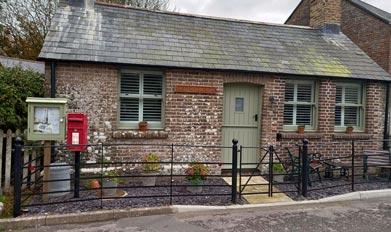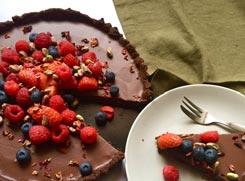
9 minute read
Health & Wellbeing
60 The West Dorset Magazine, November 18, 2022 Health & Wellbeing Walking West Dorset
with retired Dorset rights of way officer Chris Slade
Advertisement
WEST STAFFORD
Park near the church, which is usually open and worth visiting. Unusually it has an arched ceiling, which is good for acoustics. It has a gallery for the choir and organ. Next to the church is the former village Reading Room. Walk west from the church along a road that becomes a bridleway when the houses run out. On a bend you’ll see the South Winterbourne, a tributary of the Frome. The bridleway takes you under a railway bridge then crosses the bypass to enter a series of fields, following the hedge south west for half a mile until it reaches the parish boundary with Whitcombe where you join another bridleway heading uphill, south east, along the Whitcombe side of the boundary for a quarter of a mile. In the boundary bank and hedge are some old ash trees, which have been traditional boundary markers since Saxon times. Then the route changes to the West Stafford side of the boundary for another quarter of a mile, passing a tumulus on the boundary at the hill top. Soon you come to a junction with a byway where you turn left and head north eastwards to Stafford Farm, which has an old cob walled barn. The route continues as a road down to a junction at Sixpenny Gate. Turn left and follow the road northwards, downhill, through woodland, Parsonage Plantation. It takes you down to the bypass again, which you cross with care to join a path that takes you over the railway bridge then through a housing estate to meet the village street close to the Wise Man pub and the old school, which is now the Village Hall. Turn left and walk down the road back to your car. You’ll have walked about three miles.
EYES DOWN: The reading room at West Stafford
Agency offers friendships and dating
An agency helping to match people for friendships and dating – with the emphasis on the personal touch – is increasing its events in West Dorset. Just Introductions Group has been operating in Dorset, Wiltshire and Hampshire for 12 years, during which time they have made hundreds of matches – both friendships and romantic. The firm takes the time to meet everyone who wants to join, not only finding out what makes them tick to be able to match them, but vetting them in person, too. They hold eight or nine events in Dorset a month, and it is hoped to hold two or three of these in West Dorset, where they know social isolation to be an issue, particularly among people aged 50-plus. Unlike the constituency area, Just Introductions’ West Dorset area also includes Weymouth, Portland, Sturminster Newton and Blandford Forum. Emma Wood, area manager for the firm, is inviting people to join the West Dorset group and make suggestions for activities and events, which can include afternoon teas, walks, pottery and painting, or anything members wish to try. They offer three levels of membership – bronze, silver and gold, starting at £350 for a year’s bronze membership. Gold membership is £500 for five years. Members are able to pay in instalments. Emma said: “I find out what hobbies and interests they have and take their photo and make a profile for them. “Then they get to look at our
The West Dorset Magazine, November 18, 2022 61 Health & Wellbeing Pansies for joy, happiness and power
Andy Cole is a reiki healer based in Middlemarsh. He specialises in planting for healing. With the passing of Remembrance Day, we all appreciate the sacrifice of those who have given us the opportunity of the freedoms we have today. These freedoms have made us the tolerant and liberal country we have become. We have embraced the addition of new cultures and still continue to do so, but at what cost? The NHS is being crippled under the strain. The care we used to receive with face-to-face contact with others is being eroded, the advent of the computer and online this and online that, has all but destroyed customer care, people are becoming more and more isolated with less and less human contact. Mental health is suffering as a result and the overall wellbeing of people is requiring more and more attention, the economic pressure we are all now under is just adding to the stress and strain of everyday living. More people are looking for alternative therapies for treatment, but are they really alternative, or are they the original treatments which used natural remedies? These treatments have been around far longer than today’s modern medicine and history denotes that most villages had a healer of some sort. These healers were labeled as witches. (And we know what happened to the witches) These remedies were then used by the monks, and this was seen as being the correct source of treatments. Although without this intervention, medicine would not have moved forward to where it is today. All monastery’s had a physic garden with herbs and plants to create the treatments required and still do so today. This is why our gardens, parks and outdoor spaces are so valuable to us, the healing we receive and the emotional uplift we receive from the plants is making all the difference to our lives even if we don’t know it. The poppy has come to symbolise remembrance since the world wars. The
mind is a very complex thing and we still do not fully understand the inner working of it. Ideas and inspiration come from the mind when in a relaxed state, just wondering and moving from one thought to another until you get that inspiration. The poppy energies are very much like its petals, soft and fluctuating with a random rhythm. With the autumn marching on we have started to put the winter bedding in the borders and hanging baskets, primula, pansies, and viola are the main stay at this time of year. The primrose gives the appearance of being a very simple plant but the connection to the earth’s energies help provide you with a deeper understanding of your inner thoughts. It is a cleansing plant and brings relief from everyday pressures. Blue pansies symbolise calmness, serenity, and peace. Whereas purple pansies represent wealth and power and the ability to deal with the different challenges that being wealthy and powerful present. White pansies are pure and innocent. Yellow pansies are all about joy and happiness. Well, the sun is out for a while, I am off to do a bit of gardening and soak up the lovely healing energies to prepare me for whatever comes next.
in west of Dorset
directory and pick who they want to meet up with, whether they are in Dorset, Hampshire or Wiltshire – they get open access. “They are not restricted, and there’s no limit to the number of meet ups they can have.” Members can enjoy one to ones and group social events. To find out more, call Emma on 07593 542952, email emma@ justintroductionsgroup.co.uk or go to Justintroductionsgroup.co.uk

Menopause is a major life milestone for women. It is often associated with being a time of inner reflection and evaluation, and it marks a new phase of life. The official diagnosis of menopause comes after 12 months has passed without a menstrual period, which usually occurs at around the average age of 51. For a small number of women, it can occur earlier than that, sometimes in their early 40s, or even younger. Declining levels of oestrogen, progesterone, and testosterone mark the physiological changes that occur in the body. The ovaries stop producing oestrogen, but some oestrogen is still produced by the adrenal glands. Common menopausal symptoms include hot flushes, mood changes (irritability, low mood, anxiety), night sweats and sleep disturbances, poor memory, weight gain (especially around the belly), vaginal dryness, low libido, and vaginal atrophy. So how does our gut health affect our menopause? One thing we know is that as we age, we need to pay greater attention to our nutrition and self-care. Addressing gut health and other health issues during perimenopause can go a long way to preparing our bodies for a smoother menopause. Women who have been prone to hormone issues during their menstruating years may be more likely to have more symptoms during menopause. Getting your gut health and hormones into balance as early as possible is a key strategy. Some women go through a lot of emotional and physical distress during the menopause, while others sail through it. Stress does seem to play a big role in the severity of symptoms. Nutritional and lifestyle modifications, as well as ensuring optimal gut health can certainly make the transition a smoother ride. Paying attention to our gut health is one of the cornerstones of overall health, especially as around 70% of our immune system lies within the gut, and many of our hormones are made in the gut. Dysbiosis is a term used to describe an imbalance of gut bacteria, which is a common cause of irritable bowel syndrome (IBS). One way this imbalance can occur is after a course of antibiotics, when the good bacteria have been wiped out and the ‘opportunistic’ pathogens have overtaken the microbiota or microbiome (the trillions of bacteria that reside within the gut). Chronic stress, hormone changes, toxins, and other medications are all implicated in the onset of dysbiosis. For women who have gone through the menopause, declining levels of oestrogen and progesterone, may also affect IBS symptoms. This is because declining hormone levels have a detrimental impact on our good gut bacteria. Oestrogen protects the gut barrier and maintains the microbial diversity (eg healthy gut microbiome), therefore low oestrogen sets us up for a poor gut lining and potentially dysbiosis. Furthermore, oestrogen has anti-inflammatory effects in the gut, so when it declines, proinflammatory compounds can compromise the gut wall (or the gut lining) and promote an inflammatory cascade, which is also implicated in the onset of osteoporosis.

Gut feeling is key to the menopause
Helen Ross, pictured, a BANT registered Nutritional Therapist, will be giving a talk about the link between menopause and gut health at the Aquae Sulis Therapy Centre, Suite 1, 5 Damers Road, Dorchester, on Monday, December 5 at 6pm.
She uses a functional medicine approach and will be discussing the various functional testing options available that can help us get to the root cause of health issues. She works alongside her clients to help them achieve optimal health outcomes, with a focus on making simple diet and lifestyle changes. The talk is free although bookings are essential as places are limited. Bookings can be made here via eventbrite.co.uk (click on December 5).




